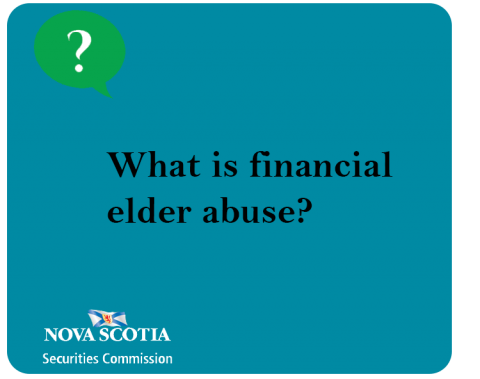Submitted by nsscadmin on

By definition, financial elder abuse is the use of someone’s money without their permission or in a fraudulent manner. Nova Scotia’s population is rapidly getting older. According to the latest census, for the first time in our province’s history, there are more people 65 and older than there are 14 and under. Financial elder abuse is already the most common form of elder abuse, and as our population continues to get older, it will unfortunately become more and more prevalent.
Financial elder abuse can take many different forms but is most often perpetrated by family, friends and close personal others.” It can be a son or daughter taking advantage of their parent’s by taking money without their knowledge or being untruthful about where money is being invested. It can be an adviser or someone else in charge of an older person’s money improperly investing, billing, or stealing money from their accounts. It can be a caregiver making improper or illegal financial decisions for the person they are caring for. Financial elder abuse does not have to involve large sums of money to have a negative impact. Even the smallest amounts can greatly affect a person’s standard of living and future. And, if these small amounts of money add up over time, it can be devastating.
Unfortunately, for some people, as they get older, they no longer have the physical or mental capacity to take care of themselves and their finances as they have in the past. This diminished capacity can make them vulnerable to financial elder abuse. Throughout the month in our blog we’ll look closer at financial elder abuse including the signs of vulnerability, warning signs someone is already a victim, and what to do to help someone that is a victim.
